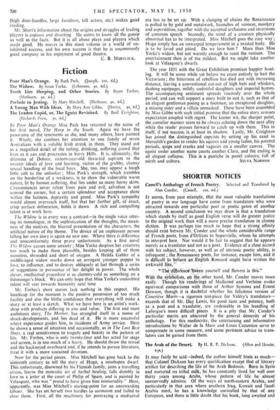SHORTER NOTICES
IT seems, from past eihmple, that the most valuable translations of poetry in our language have come from translators who, were attracted towards one particular poet or poetic genre of another country. A second conclusion we may draw is that a translation which stands by itself as, good English verse will do greater justice to the original work than will a more precise translation in clumsy diction. It was perhaps too much to hope that a strong affinity should exist betwen Mr. Conder and the whole considerable range of French poets, from d'Orleans to Supervielle, whom he attempts to interpret here. Nor would it be fair to suggest that he appears merely as a translator and not as a poet. Evidence of a close accord with his subject, however, as well as of intrinsic poetic ability, is infrequent ; the Renaissance poets, for instance, escape him, and it is difficult to believe ati.English Ronsard might have written the awkward filie, • . . yourtelf and flowers is this." . With the symbollsts, on the other hand, Mr. Bonder moves more
easily. Though his renderings of. Mallarme and Verlaine evoke equivocal comparisons with those of Arthur Symons and Ernest Dowson, though it is doubtful whether his felicitous 'version of Cimetiere Marin—a rigorous test-piece for Valery's translators— exceeds that of Mr. Day Lewis, his good taste and potency, both as a poet and a translator, are undeniable in his handling of Laforgue's more difficult pieces. It is a pity that Mr. Conder's particular merits are obscured by the general demerits of his anthology. For this mediocrity, the entertaining and informative introductions by Walter de la Mare and Louis Cazamian serve to compensate in some measure, and some pertinent advice to trans- lators can be gained from them.










































 Previous page
Previous page